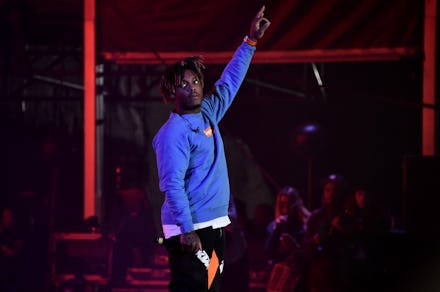The death of Juice WRLD could mark the end of the "SoundCloud Rap" era

In 2016, a peculiar music movement known as “SoundCloud Rap” began its reign. In 2019, it seemingly ended.
The genre was a unique blend of emotionally-charged lyrics being sung and rapped over beats tied together with low-fi production. It was made popular by artists likes Lil Peep and Juice WRLD, among others. They could be recognized by their vibrant dyed hair and face tattoos. They would play small shows for outcast teens who would soon become a far-reaching community.
Their tracks became anthems — often depicting serious challenges with drugs and mental illness in a way that, to fans, felt raw. On his track “The Way I See Things,” Lil Peep famously belted out, "I got a feeling that I’m not gonna be here for next year so let’s laugh a little before I’m gone,” while Juice Wrld crooned, “we ain’t making it past 21,” on his single “Legends.” XXXTentcion sang, “I control my own death, I don't need no fucking help,” on his single “King Of The Dead.”
Over the last few years, all three of those artists have passed. Lil Peep, born Gustav Elijah Åhr, died of a drug overdose in 2017, barely two weeks after his 21st birthday. XXXtentacion (who was awaiting trial for domestic abuse at the time of his death) was shot and killed during an attempted robbery in 2018, six months shy of his 21st birthday. Most recently, on December 8th, Juice WRLD, born Jarad Anthony Higgins, died. Just a week after turning 21.
Suddenly, a scene built on the angst of misunderstood teens collectively combating their own demons had succumbed to the very issues they found solace in being open about.
Juice WRLD burst onto the scene in 2018 after releasing his debut album Goodbye & Good Riddance, which peaked at number six on the Billboard 200. His popularity on SoundCloud began years earlier, when he started uploading his tracks under the username JuiceTheKidd, in 2015, when he was just 17 years old. Over the next four years, Juice WRLD gained attention from some of music’s biggest producers and artists, collaborating not only with major label hip-hop acts like Travis Scott, but also crossing over into pop music. Like his collaboration with Ellie Goulding on her anti-love track, “Hate Me.”
Like many artists in the scene, Juice WRLD mentioned drug abuse in his lyrics, but also tried to put positive spins on serious issues. He spoke candidly of depression, drugs, and even suicide, often weaved alongside infectious hooks made to be sung along in unison. Like anthems for the downtrodden. It’s likely what resonates with followers of SoundCloud rap, and why the platform was poised to define Gen Z's taste in music. Despite their negative themes, it showed young fans that if these artists could get through it, so might they.
There was a sense of unity among SoundCloud rap's fans. The artists they adored all started from underground beginnings before exploding into the mainstream as their popularity increased. In just a few years, acts like Juice WRLD and Lil Peep went from uploading songs from their bedrooms to performing with larger-than-life projections in venues around the world.
Then, things took a turn.
If SoundCloud rap was a movie, you might say it ended before its third act. The stars who helped build the scene have tragically fallen, and continuing on without them seems wrong. What happens to fans who lose their biggest idols? Teens and young adults who listened in solidarity to lyrics of depression and addiction.
Juice WRLD soared back onto the charts in the week since his death. Suddenly, the lyrics, “This is dedicated to you if you felt the lowest of the low, I know how it feels, you don't wanna struggle anymore" sung over the relaxed beat on the “Rich and Blind” don’t come off as inspirational, but as a sad reminder that Juice WRLD won’t be a part of his community in the same way anymore.
Though the music lives on forever, it’s not clear where the genre will go from here. Fans have campaigned for more mental health and addiction resources for young artists who are flung into the spotlight. Many artists in the genre would recount their experiences with drugs like Xanax and discuss their struggles in their own lyrics. While it would bring together fans who experienced similar issues, there can be a fine line between singing about suicide and crying out for help.
It seems as though the “SoundCloud Rap” genre has come to a depressing halt. Maybe it’s simply a result of all of the downfalls in the community. Or maybe it's that the genre's impact on the mainstream has allowed major labels to consume once avid fans of niche rappers on SoundCloud. Nevertheless, the legacies of the decade’s young crop of vulnerable rappers will have a lasting impact. As Juice WRLD said, “More importantly, I'm tryna change the world.”